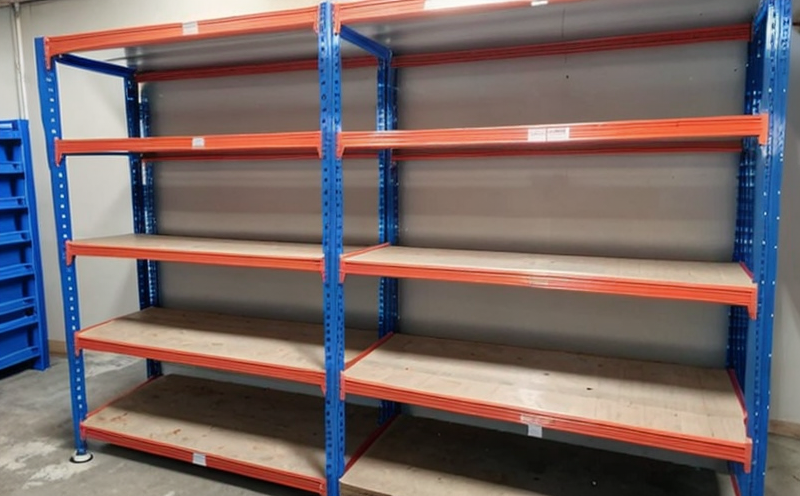Adjustable shelving inspection
The inspection of adjustable shelving systems is crucial in ensuring that they meet safety standards and are fit for their intended use. Adjustable shelving units are widely used in various sectors such as retail, manufacturing, warehousing, and distribution centers to store goods efficiently. The design flexibility offered by these shelving units allows them to adapt to different storage needs but also introduces the potential for structural and safety issues if not properly manufactured or installed.
Adjustable shelving systems are subject to significant mechanical stress due to heavy loads and constant movement of materials. Therefore, thorough inspection is necessary to prevent accidents that could result in property damage, injury, or even loss of life. Compliance with relevant international standards like ISO 16287:2013 (which covers the design, manufacture, installation, and use of warehouse systems) ensures that these units are built to withstand the demands placed upon them.
During an inspection, several key aspects need attention:
- Structural Integrity: Checking for any signs of deformation or damage in the frame or support structure. This includes verifying that all components are securely fastened and that there is no visible wear-and-tear.
- For metal shelving, inspect for rust or corrosion which can compromise stability over time.
- In wooden units, look out for rot or warping due to moisture exposure.
Load Capacity: Ensuring that the shelving unit is capable of supporting the maximum weight it is intended to hold without compromising safety. This involves testing the load-bearing capacity under static and dynamic conditions using calibrated equipment. Compliance with standards such as ASTM D7562 helps in determining safe loading practices.
Stability: The ability of the shelving system to maintain its position during normal use, especially when subjected to lateral forces or vibrations. A well-designed unit should have anti-tip devices if it is tall enough that there's a risk of tipping over.
Accessibility: Making sure that the shelves are accessible and can be used without causing discomfort or injury. This includes checking for proper spacing between levels, ease of movement within the unit, and ergonomic design elements like rounded edges to avoid cuts.
The inspection process often involves detailed documentation and reporting. Reports typically include photographs and measurements taken during the inspection to provide visual evidence supporting any findings. Non-compliance issues are highlighted along with recommendations for corrective actions if necessary.
Regular inspections of adjustable shelving units contribute significantly towards maintaining a safe working environment, optimizing space utilization, and extending the lifespan of these essential storage solutions. By adhering strictly to best practices outlined in industry standards and guidelines, organizations can mitigate risks associated with improper use or installation while enhancing operational efficiency.
Why It Matters
The importance of inspecting adjustable shelving systems cannot be overstated given the critical role they play in many industries. In retail environments, mismanaged shelving could lead to product damage due to improper stacking heights or unstable structures. Manufacturing facilities rely heavily on these units for efficient inventory management; any failure can disrupt production schedules and increase costs.
Warehouses face particularly high stakes when it comes to shelf integrity because they handle large volumes of goods under varying environmental conditions. Poorly maintained adjustable shelving increases the likelihood of accidents involving employees who must navigate potentially hazardous areas daily. Moreover, insurance premiums may skyrocket if incidents occur leading to claims against the facility.
From an organizational perspective, investing in regular inspections not only protects personnel but also demonstrates corporate responsibility towards stakeholders. It fosters trust among customers and suppliers alike by showcasing commitment to quality assurance processes across all aspects of operations.
Eurolab Advantages
EuroLab stands out as a premier choice for adjustable shelving inspections due to its comprehensive approach and unwavering dedication to accuracy, reliability, and safety. Our experienced technicians possess extensive knowledge in materials science, mechanical engineering, and quality assurance practices which enable them to conduct thorough evaluations of even the most complex shelving configurations.
We employ state-of-the-art non-destructive testing techniques such as ultrasonic flaw detection and magnetic particle inspection to assess internal integrity without causing damage. Our commitment to precision ensures that every detail is accounted for in our assessment, providing clients with peace of mind knowing their investments are safeguarded against potential hazards.
Moreover, EuroLab stays abreast of latest developments in relevant standards like ISO 16287:2013 and ASTM D7562 ensuring compliance requirements are met at all times. Our reports are detailed yet easy to understand, offering actionable insights for continuous improvement within your organization.
EuroLab’s reputation precedes us, built on years of successful projects completed with integrity and excellence. We take pride in delivering services that exceed expectations while maintaining strict adherence to ethical business practices.
Why Choose This Test
Selecting the right testing partner is vital when it comes to ensuring your adjustable shelving systems meet stringent quality standards. At EuroLab, we offer a range of inspection services tailored specifically for this purpose:
- Comprehensive Evaluation: Our team conducts detailed assessments covering all critical aspects including structural integrity, load capacity, stability, and accessibility.
- Expertise and Experience: Leveraging our extensive experience in material analysis and quality control allows us to identify subtle yet significant issues that might otherwise go unnoticed.
- State-of-the-Art Technology: Utilizing advanced diagnostic tools ensures accurate measurements and thorough examinations, enhancing the reliability of our findings.
The benefits of choosing EuroLab extend beyond mere compliance. By partnering with us, you gain access to cutting-edge methodologies that ensure your shelving systems remain safe and efficient over extended periods. Additionally, our proactive approach helps prevent costly downtime by addressing potential problems early on before they escalate into major issues.





